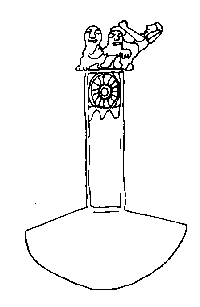
Q. On some British and Irish early medieval artefacts, extremely fine coiled and twisted gold wire was used presumably for decoration (see for example, Susan Youngs ed. 1989 The Work of Angels: Masterpieces of Celtic Metalwork, 6th-9th centuries AD. British Museum Publications). The twisted coils are often too fine to be easily detected and sometimes a magnifying glass is needed in order to see the detail. How did the artisans make such fine wire, and, if it was barely visible to the naked eye, why did they think of making it in the first place?
Q. We all know the opening line to many a children's story but where did the phrase 'Once upon a time...' originate? Moreover, can we ever be truly 'upon' time anyway?
Q. How on earth did someone come up with the idea of body decorations such as tattooing e.g. those found on the Iceman, piercing or for that matter, the various forms of genital mutilation which are practised around the world today, from male and female circumcision to infibulation and subincision? Why, why, why? We know the modern day rationales for these things but how did they start? What's the earliest evidence for them or indeed for other forms of body adornment/modification such as hairstyling?
Q. How and why did trepanning start? Are there any medical reasons for drilling holes in the skull of someone living?

Sculptured 'tumi' handle and detail (below) showing crying patient being restrained while trephination is performed (Original drawings by Jennie Hawcroft after A.Asenjo 1963 Trephining among the American Peoples: Inca trephination. In Asenjo (ed) Neurosurgical Techniques Charles C Thomas, Springfield, IL, pp 20-26)

How can someone survive such an operation (or sometimes even more than one) and moreover, why would they want to? There are several examples of trepanning scars in skulls from prehistory (see for example D.Campillo 1984 Neurosurgical Pathology in Prehistory Acta Neurochirurgica 70, 275-290, Trepanning References or Ancient Brain Surgery), but how were these performed without the use of anaesthetic?
We would love to hear from you if you have responses to any of these little mysteries, (all guesses appreciated, even wild ones!) or if you have any questions of your own.
Please send us your answers, queries, questions and quibbles NOW!
Cue corny catch-phrase...
Don't delay! Email us today!
Email us today!

�assemblage 1996